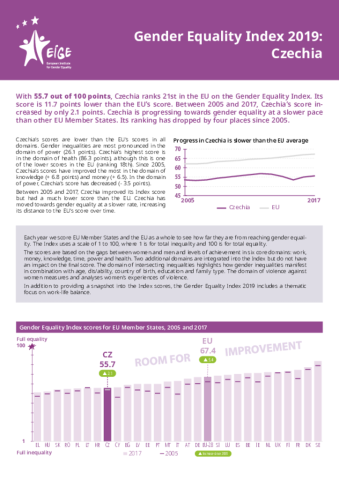With 55.7 out of 100 points, Czechia ranks 21st in the EU on the Gender Equality Index. Its score is 11.7 points lower than the EU’s score. Between 2005 and 2017, Czechia’s score increased by only 2.1 points. Czechia is progressing towards gender equality at a slower pace than other EU Member States. Its ranking has dropped by four places since 2005.
Czechia’s scores are lower than the EU’s scores in all domains. Gender inequalities are most pronounced in the domain of power (26.1 points). Czechia’s highest score is in the domain of health (86.3 points), although this is one of the lower scores in the EU (ranking 18th). Since 2005, Czechia’s scores have improved the most in the domain of knowledge (+ 6.8 points) and money (+ 6.5). In the domain of power, Czechia’s score has decreased (- 3.5 points).
Between 2005 and 2017, Czechia improved its Index score but had a much lower score than the EU. Czechia has moved towards gender equality at a slower rate, increasing its distance to the EU’s score over time.
Explore the Gender Equality Index 2019 on our website and find out the score for your country.
